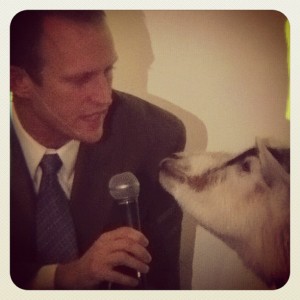
At a Lancaster, Pa., breakfast attended by over 400 HOPE supporters, we welcomed a very special guest: a talking goat! HOPE President Peter Greer interviewed Colette the goat on the impact of goat ownership in Rwanda while she happily tried to munch on the microphone.
Peter: We did encourage attendees to bring friends this morning, and someone really gets points for thinking outside the box! …This is Billy the Goat.
Goat: Actually, my name is Colette.
A talking goat! You knew you came to HOPE’s breakfast to see something special! Well, Colette, it’s a privilege to have you here. This is a rare opportunity for us. May I ask you a couple questions?
Of course!
Last year we conducted an impact assessment of our savings program in Rwanda, and we saw that goat ownership had increased by 101%. Does that surprise you?
Not at all. We’re an affordable, yet impactful, asset. In Rwanda, a goat costs around $20 , and many savings groups commit to providing one goat for each member. Rwanda is also a densely populated country, where most residents live on small parcels of land. Goats don’t take up much space, and we’re known for eating whatever’s available. Our owners don’t have to worry about finding enough to feed us!
What are some of the practical ways that goats are changing lives?
Well, Peter, I’m not sure how to make this meal-time conversation, but one of my greatest contributions is what I produce after eating. … Nearly 90% of Rwanda’s population engages in subsistence farming, and good fertilizer can significantly enhance their efforts. More crops mean that families are better fed, and there may even be some left over to sell at a local market.
We’re also known to be prolific. On average a female goat has two to three kids a year, which can be sold or given to other families in need. And although we make lovely pets, goats are also an important source of…protein…in Rwanda. But don’t get any ideas! Seconds on the bacon, anyone?!















